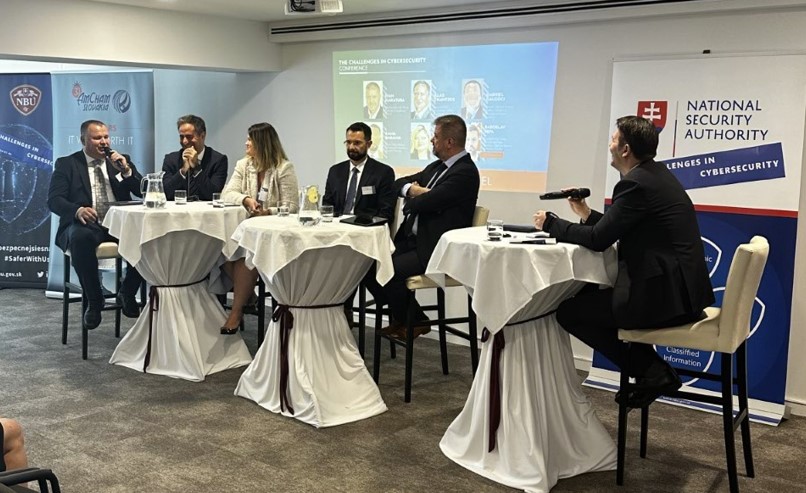Excited to share highlights from our recent cybersecurity conference in Brussels!
The event brought together experts from across Europe to discuss
pressing cybersecurity challenges and strategies for improvement.
We were honored to have Petra Vargová, Permanent Representative and Ambassador of the Slovak Permanent Representation to the EU, open the conference. Her wise words emphasized the growing complexity of cyber threats, particularly with advancements in AI. As well as highlighted the significant costs associated with breaches that set the stage for the following panel discussions.
We were also honoured to have Mrs. Lajos Szabo, Managing Director of the National Cyber Security Centre of Hungary, join us virtually as he shared valuable insights on the urgent need for more cybersecurity skills and resources. His memorable quote, "Cybersecurity is like riding a bicycle – you have to keep pedaling to keep up," perfectly captured the continuous effort required to stay ahead in cybersecurity.
Key Discussion Takeaways:
- Regulatory Adaptability: The importance of flexible regulations, such as using GDPR as a benchmark.
- Financial Drivers: Recognition that 95% of cyber-attacks are financially motivated.
- Policy and Legislation: Balancing the need for new laws with their associated costs.
- Standard Harmonization: The benefits of unified cybersecurity standards across the EU.
In short, the conference highlighted the multifaceted challenges and necessary strategies for advancing cybersecurity in an increasingly digital world. The importance of continuous effort, collaboration, and strategic investment were recurrent themes throughout the discussions. Further, the panel discussions only reinforced and emphasized the critical role of education, strategic investment, and continuous collaboration in enhancing cybersecurity.
Special thanks to our co-organizers: the National Security Office of the Slovak Republic, the Ministry of Foreign and European Affairs of the Slovak Republic, and the Cyber Security Competence and Certification Centre.
The AmCham Digital Committee is committed to addressing these cybersecurity challenges. Together, we are building a safer digital future.
Summary of Conference Notes
The conference began with two introductory speakers who set the stage for the following discussions.
Petra Vargová's Perspective: Petra Vargová, Permanent Representative and Ambassador of the Slovak Permanent Representation to the EU, provided insightful commentary, expressing numerous fears and challenges associated with cybersecurity. She highlighted the increasing complexity and frequency of cyber threats, particularly with advancements in AI, and the significant costs associated with cybersecurity breaches.
Lajos Szabo's Perspective: Lajos Szabo, Managing Director of the National Cyber Security Centre of Hungary and EU Parliament Resident, spoke about the critical shortage of cybersecurity skills and the billions lost due to cybersecurity breaches. He likened cybersecurity to riding a bicycle, saying, "Cybersecurity is like riding a bicycle – you have to keep pedaling to keep up." He stressed the importance of ongoing cybersecurity measures to protect personal, societal, and organizational values.
1st Panel Discussion:
The first-panel discussion delved into the intricacies of EU regulations and the need for amendments to accommodate the diverse needs of member countries. The debate frequently referenced the GDPR as a well-known regulatory framework. It was noted that while the EU aims to regulate comprehensively, its approach is generally less sensitive than the US.
A key point of discussion was the differences in data regulation approaches between the EU and the US. The panel highlighted that 95% of cyber-attacks are financially motivated, underlining the economic stakes. The challenges of complex cybercrime were also discussed, with the private and public sectors often lacking the necessary resources.
The panel explored the importance of public policy in achieving better cybersecurity, the necessity of new legislation, and the potential costs of such regulation. It was noted that regulations should remind investors of their responsibility while allowing markets to be somewhat self-regulatory, a traditional US perspective.
The discussion also touched on the benefits of harmonizing standards within the EU to create a more robust collective defense against cyber threats. Comparisons were made between the EU and the US, noting the historical differences in market development and regulation. Identifying and growing in less competitive markets, or "blue oceans," was suggested as a strategic approach.
2nd Panel Discussion:
The second-panel discussion focused on the practical aspects of cybersecurity implementation. It was emphasized that entities need help understanding and transitioning smoothly to new cybersecurity measures. The "devil is in the implementation phase," highlighting the challenges of compliance procedures and timelines. A partnership with governments was advocated, with member states often wishing to control their data.
The rapidly changing landscape of cybersecurity was discussed, with significant shifts observed over the past two years. The importance of taking cybersecurity seriously as a stepping stone for future developments and the critical role of standards in the cyber world was stressed.
Panelists discussed the growing cybersecurity market in the EU, noting that while initial investment in startups is substantial, there is less investment in later stages. The lack of investment from corporate and pension funds in cybersecurity was identified as a significant issue.
The discussion also covered self-assessment challenges and the need for compromise, such as amendments that are only sometimes available in English. The potential for AI to aid in implementation and make processes easier was also explored.
Finally, the panel addressed the importance of security education and the impact of legislation on security. Data sensitivity and regional specificity were acknowledged, along with the need to operate globally across both the private and public sectors. The goal of completing the single digital market and resisting the temptation of new laws with every technological advancement was emphasized.
In conclusion, the conference highlighted the multifaceted challenges and necessary strategies for advancing cybersecurity in an increasingly digital world. The importance of continuous effort, collaboration, and strategic investment were recurrent themes throughout the discussions.


Follow us